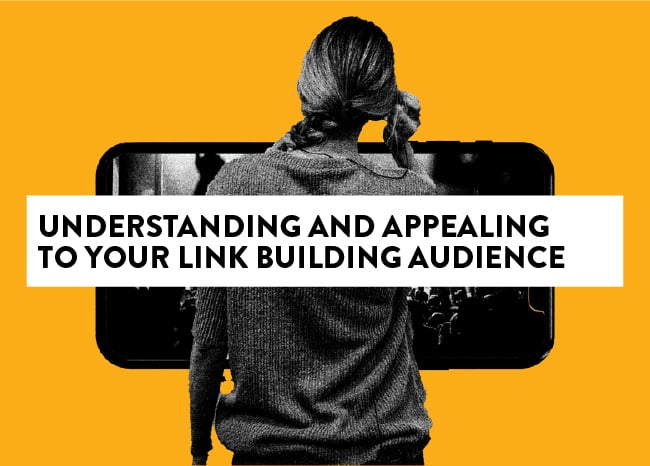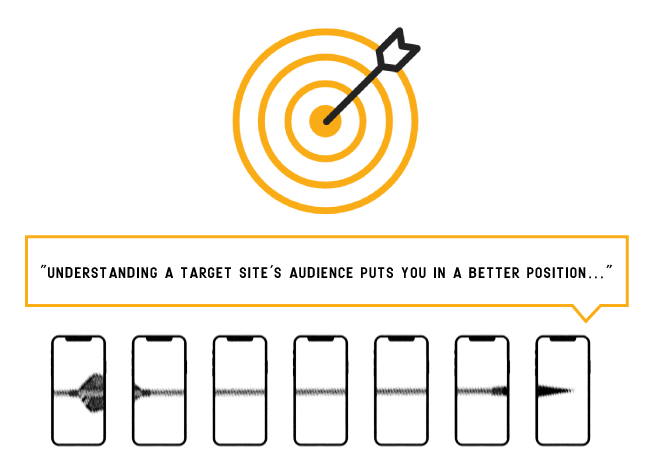
My first exposure to SEO was in a college linear algebra class where we read an essay about Google’s initial PageRank algorithm. PageRank worked according to eigenvectors of weighted link matrices, using links as “votes of confidence” for a webpage to answer a searcher’s query.
Modern link building may look different from the early days of search, but the goals and principles of PageRank can still inform a successful link building strategy today. To build relevant, authoritative links, you have to provide value to the end user, and you can only do that if you put in the effort of understanding their wants, needs, and interests.
Who Is the Audience in Link Building?

Even in SEO, your audience is not just Google. Links have multiple audiences that you’ll need to understand in order to form human connections. Better connections result in the most natural, relevant link placements that ultimately benefit your business in organic search. A link target audience consists of website editors, webmasters, target site readers, marketing managers for other businesses, and of course, search engine crawlers.
Although today there are over 200 ranking factors in Google search, there’s no denying the importance of backlinks (links that point back to your domain). The best way to earn them is by understanding your link target audience.
Determining Your Target Audience for Link Building

Your link audience differs from your site’s target audience in one main way. Your link audience is not explicitly looking for your products or services. Target sites — where you intend to build links — will usually either have a broader or narrower audience than your business audience.
For example, if your business audience is IT professionals, you could look at a broader audience of STEM students and look to outreach blogs about education. Or maybe your business audience is creatives. You could narrow your focus to find audiences of women-centered entrepreneurial blogs.
To effectively find audiences, you’ll want to identify relevant niches for your business and then search for them online using advanced search operators or other site-finding techniques. You might be surprised at how sites you never thought of outreaching can be topically connected to your content. Both domain and content relevance are important and pursuing a balance will give you a diverse link portfolio and a higher success rate.
Understanding the Target Site Audience’s Wants, Needs, and Interests

To build links, you need to have a solid understanding of the wants, needs, and interests of the site you are connecting with. The more you understand their content and their audience, the better chance you’ll be able to get them to care enough to put in the work of actually linking to your content.
To understand the content a target site wants to see:
- Take time to look at the content they currently cover, the format of their content (how-tos, listicles, news), and their tone.
- Look for audience engagement. Determine which posts perform well and get more comments or social media shares. This will help you gauge who is actively reading their site and the things they want to see.
- Look at their backlink profile. See what articles are being mentioned on other sites and in what context.
- Check what keywords they are ranking for and look at searcher intent. This lets you see why people are visiting the site.
Understanding a target site’s audience puts you in a better position to appeal to them with your own links, naturally placed in content that their readers are interested in.
Using Human Connection To Build Fruitful Relationships and Links

In a sea of templated emails and AI-written articles, you’re a real person (hopefully) writing real content that brings value to real readers. Emphasizing this in every stage of your link building process will encourage your link targets to take that leap of faith and publish your links. You know what it’s like to get spammed with de-personalized emails asking you to take some action (fill out a survey, spend money) with no benefit to you. Come from a place of understanding the usual pitches and requests that site editors receive. Taking the time to personalize your emails to the site and demonstrating your knowledge of their audience and the topics you’re pitching will set you apart from the sea of de-personalized emails flooding editors’ inboxes.
Pitching and Outreaching Target Sites
When you find link targets, you want to prioritize building a human connection throughout topic ideation, pitch formation, and the outreach itself.
- Personalize emails, but not in a disingenuous way;
- Spend time pitching topics the target site’s audience is interested in;
- Make sure you sound like a real human and let your site’s voice and ethos shine;
- Come from a place of understanding and empathy;
- Don’t waste their time.
Remember, you are not entitled to links. Links are earned, not given — no one has to publish your links. The delivery is just as important as having authentic content. You need to demonstrate the value you can bring to the person on the other end of the web if you want to successfully build links.
If you approach people and craft linkable content with an audience-focused mentality, you’ll be much more successful in building human connections. As the saying goes, “It’s not what you know, but who you know”— this couldn’t be more true in SEO. Even if you have good content on your site, approaching target sites with generic or irrelevant pitches will not get them to link to you.
Building connections helps you build links with the most natural and relevant placements that count as real votes of confidence in your content.
Human Connection and the Evolving Search Algorithm

Anyone can build links on content farms or through paid guest posting. What makes you and your links different? Why should websites link to you? If you don’t have answers to these questions or content that speaks to their audience, you will be stuck with low-quality, low-relevancy backlinks that lose power as Google’s algorithm becomes increasingly “human.”
Back in the early days of search, all sorts of links could get your site visibility, but backlinks today are valued differently depending on factors including anchor text, the E-A-T of the site they’re on, and keyword density.
As search engines update their ranking algorithms to become more “human,” the value of editorial links that come from real votes of confidence grows. This means you need a developed and nuanced understanding of the web’s human audience.
To understand what makes a natural and relevant link, you have to put yourself in the web user’s shoes. Is your link something you’d actually click on? Or does it stick out like a sore thumb? Web crawlers can discern the difference, and for a sustainable link building strategy you need to do the same. The end user’s experience is the priority of search engines, so it should be yours as well.
How This Approach Benefits Your Business

Ultimately, approaching a link building campaign with reader-first relevancy in mind, cultivating an audience-focused mindset, and taking the time to understand your link building audience will benefit your business in search.
Take a step back and think about what you want to see when you browse the web. Sponsored articles full of promotional or affiliate links often lose the reader’s trust. With so much information available, users today are well-equipped to decide who to trust and what to read.
By doing your research and understanding your link target audience, you’ll be able to build human connections and relevant links with natural placements, making for a sustainable SEO strategy that can weather the changes in search algorithms.
Conclusion
Thinking back to PageRank, a lot has changed, but the principle hasn’t. Google still wants to provide users with the most relevant answers to their queries and links still matter. The weighting of backlinks might be different, but links can and do still represent votes of confidence from other sources.
To get people to cite your resources, you have to provide value to the reader, and you can only do that if you put in the effort of understanding the people who will see your links.

